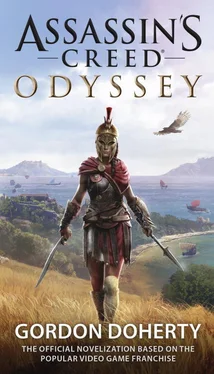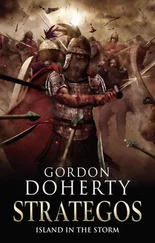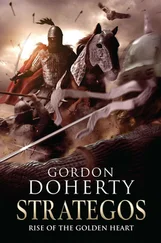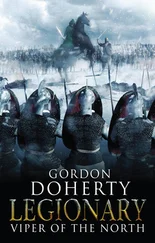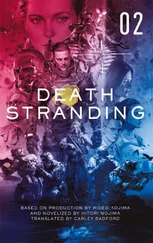“The kryptes have been cruel to you,” she said, thinking of the young Spartan men whose job it was to torment the Helots. She felt a rising sense of pity for this poor wretch, and of loathing that her homeland was built on such cruel pillars.
Lydos shuffled in discomfort, licking his lips, refusing to meet her eye. “It was not the kryptes.”
“Then who?”
“King Archidamos’s temper is legendary. He lets his anger loose on us Helots. He had me whipped with a barbed scourge for interrupting him while he was having talks with a group of strange visitors one night. Over the years he has broken my ribs, my leg, my nose.”
“Your cheek?”
He smiled awkwardly. “No, that was King Pausanias. He is less cruel, and that wound was deserved. I was pouring wine for him one night and I clumsily spilled some of it. I tried to mop it up with the hem of my tunic. I really did. But I just made a bigger mess—making a wine print of my hand on the edge of a document he was writing. He rose and punched me. At least he stopped there. If it had been Archidamos, I would have been beaten to a pulp.”
She lowered her voice, as if afraid Cultic spies might be listening in this open, deserted countryside. “You said Archidamos… had strange visitors one night?”
Lydos frowned. “Travelers from afar, strange to my eye and ear. But then even Spartans are strange to us Helots. I mean no offense, of course.”
She tipped her head to one side to indicate none had been taken. “Did these visitors wear anything odd… like masks?”
He seemed confused. “Masks? No. They wore the garb of officials and traders.”
She sought another angle to question him, but could not find one. An owl hooted, breaking her chain of thought, and she realized that time was pressing. They continued southwards, spotting a low plain of ferns and a glow of torchlight on the coast ahead.
“Korsia,” Kassandra whispered. “This is one of the two harbor villages.”
Lydos nodded hurriedly.
“So you remember everything I told you?” she added.
Lydos nodded again.
She sighed, wondering if this was a mistake, and one that might be the death of her. “Go,” she said at last.
Lydos hitched his leather bag and sprinted off into the black hills overlooking Korsia.
Kassandra crept forward through the ferns toward the harbor village, Ikaros on her shoulder. The night was muggy and the sky treacherously clear—the moon and stars like torches, betraying everything in their veil of ghostly white. She stooped to lift earth as she went, blackening her face and arms. Toads croaked and foxes and voles darted. She came to a halt an arrow shot from Korsia. Hundreds of Athenian hoplites lined the wooden walls of the dock itself, and the rest of the garrison—two taxiarchies each five hundred strong, she counted—sat encamped in and around the village streets. She understood Stentor’s reticence—assault this well-defended place with his five hundred Spartans and lose, and Boeotia would fall into Athens’s hands. The war might pivot on such a defeat. She heard the bawdy roars from the tavern, saw the silent vigilance of the archers patrolling the rooftops and watching the seas, admired the rugged claws of coastline that struck out into the sea on either side of this soft, short bay. There was one structure that stood out above all the others—a freshly hewn timber tower, upon which an archer captain strode, his bare chest and white cape glinting in the moonlight. Far beyond, she even saw the dark shapes of the Korinthian fleet, picked out by torches. Waiting out at sea in impotence. The Athenians had the coastline so well watched that the flotilla could not hope to make shore without losing most of their men in the initial landing.
She looked into the heart of the town, and at the archer platform once again, then at the dark hills behind her. For all the world she was sure Lydos was right now bounding through the heights, making a break for freedom. Too late to worry about that. She sighed.
Turning back to the town, she shrugged one shoulder, setting Ikaros to flight, then stole through the ferns, toward the town’s outskirts. The landward-facing Athenian guards were less numerous, and she found one asleep. A way in. She vaulted a low fence, creeping through a private yard, then peered over a half wall, seeing the village’s main packed-dirt road and the foot of the high timber archer tower. She watched a pair of Athenian hoplites stroll past, then leapt up and over, rolling into a tall pile of hay just before another pair came into view. She heard their muted conversation rise then fade as they too passed. Climbing free of the straw, she came to the base of the archer tower. Here, a stink of resin spoiled the air. She saw scores of amphorae of the stuff stacked around the tower’s base. Death by fire for any Korinthian vessel that dared approach. There was a strange device too: a hollow, ironbound beam as long as a mast, with bellows at one end and a cauldron hung with chains at the other end. A war machine of some sort? For a moment, her mind began to work on a new plan…
But that would only matter if she did what she needed to here. She turned her attention from the strange device and looked up. The timbers were smooth, but she saw notches and binding ropes here and there, and as soon as she had picked out a climber’s path to the top, she set off. Her fingers ached with the effort, her shins burning as they slid on the ropes and wood. Near the top, she heard the archer captain’s slow, deliberate strides, and the heavy breathing of another. She halted when they began to speak.
“The Korinthians will turn for home by the end of this moon. The Spartans will be forced back to their farms too, and then Thebes will fall,” the captain mused. “The war will turn on our efforts here,” he said, “and our part won’t be forgotten.”
“But, Captain Nesaia. What you did…” said the heavy-breathing other. “The families you killed here.”
“It was naught but the spoils of conquest,” Nesaia scoffed. “You will be getting the blame, should the matter ever arise. And you—”
Kassandra leapt onto the archer platform. Both men swung to face her. “Set your minds at rest,” she said, “the matter is over.” She flicked out one hand, the small knife in her bracer streaking out to take the heavy breather in the neck, her spear flashing forward to plunge into Captain Nesaia’s chest. They both fell without a sound. She waited a few moments to be sure nobody down below had noticed, then set her mind to the next step of the plan.
She turned not to the sea, but to the landward side of the village, stared at the black hills, cupped her hands around her mouth and made a shrill call like that of a bird. Three times.
Then… nothing. Just the continued clacking of tavern cups and rumbling laughter. She glared at the hills. You fool, she cursed herself.
Now she saw a few figures turning from the dock palisade and squinting up at the archer tower. “Nesaia, all quiet?” one called.
Kassandra froze. “Aye, nothing,” she boomed in her best attempt at the dead captain’s voice.
Then she saw, to her horror, the runnel of blood oozing from Nesaia’s body and spilling from the platform edge.
“Blood?” the voice of a passing guard murmured down below. “Something’s wrong. Up on the tower.”
Footsteps staggered from the nearest tavern. The warm repartee changed, the voices becoming hard-edged.
“Nesaia? What’s going on up there?”
She heard the scrape of boots, felt the timbers shaking as men began to climb up. Ikaros swooped from the night to claw at the climbing men, but he could not stop their ascent.
Then the night shook with the most haunting moan of Spartan war pipes. The plaintive howl spilled from the dark hills and poured across the ferns, flooding the streets of Korsia.
Читать дальше
